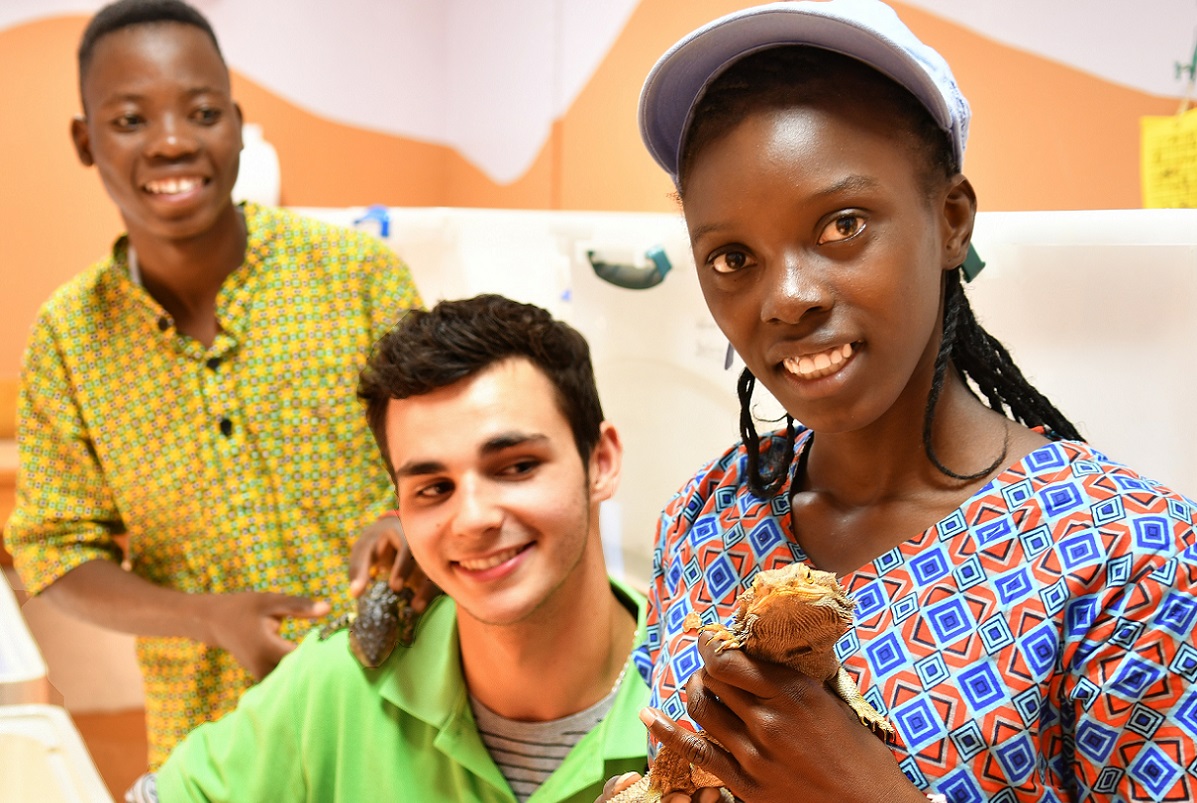
Aussie eyes were opened to the challenges of conservation in a developing country where sustaining incredible wildlife can rank low on the hierarchy of life’s priorities, while youths from Zambia eagerly encountered some of Australia’s friendlier reptiles, in a visit to Flinders University on 2 May.
The enthusiastic delegation of conservation-minded Zambians are members of a conservation club run by Chipembele Wildlife Education Trust, in the remote rural village of Mfuwe, next to South Luangwa National Park. In Australia on an eagerly awaited exchange program with Zoos SA, their university visit was part of a three-week tour to share information with like-minded local youth.
It’s part of a bigger project that aims to expand the global conservation effort. The first stage of the Tisamale Global Exchange saw seven Australian youths (members of the MATZ group – Mentors at the Zoo) visit Zambia in June last year to learn about the priorities and efforts of the small group that’s making a big impact on Zambian wildlife.
The final stage of the project involved 14 student members of Chipembele coming to South Australia to participate in programs at Monarto and Adelaide Zoos, Cleland Wildlife Park, Glenelg Beach, Innes National Park and Paiwalla Wetlands. It also included a cultural tour of the city, visits to local schools and to Flinders University – where they checked out the Biology Discovery Centre, Animal House, and $1.1 million dollar Palaeontology Hub.
The Zambian teenagers joined the Australian youths in a presentation to staff and students at Flinders University that shared their conservation efforts and the challenges faced in their respective countries.
They told of the controversial Zambia hippo cull, a government decision allowing trophy hunters to pay for the opportunity to kill up to 2,000 hippos over five years in the Luangwa River Valley. Previously suspended over global backlash, the project is set to go ahead with the first hunt imminent despite a lack of scientific evidence to support the cull and the status of hippos as a ‘vulnerable’ species.
Paul Kotz is in his second year of a Bachelor of Science in Animal Behaviour at Flinders University and a member of the Zoos SA MATZ group. He participated in the university tour and talk, and was also fortunate to visit Zambia last year.
Mr Kotz says the Tisamale project is all about giving youth the opportunity to experience, love and grow from the extraordinary people in global conservation, and the awe-inspiring places and animals they strive to protect.
“We went over for three weeks spending time in the Zambian community. It was such an amazing experience, one that I’ll always hold dear.
“It was just awesome meeting up with the Zambian students again after bonding last year. There was no need to get re-acquainted, we were like old friends the moment they stepped off the plane.”
During their fleeting Flinders visit the visitors enjoyed meeting a Pygmy Blue Tongue Lizard, a baby Shingleback Lizard and a Bearded Dragon, as part of an interactive presentation given by Associate Professor Mike Gardner.
Associate Professor Gardner’s vision is to “study the intricacies of the natural world to instil others with a sense of awe and wonder” and was suitably rewarded by his enthralled audience. They learned much about the lizards of South Australia, including how the Pygmy Blue Tongue, thought to be extinct, was re-discovered in the stomach of a dead Eastern Brown Snake – kicking off a challenging search for its relatives until someone thought to look in a spider hole, its residence of choice.
As part of the MATZ program, Mr Kotz helps to run zoo camps and workshops, lead the SA Youth at the Zoo group, and undertakes training and conservation projects.
“It’s really come to my attention how much I love working with younger people,” he says.
“I don’t know exactly what direction I’ll follow, maybe education, maybe animal conservation, as long as I follow my passion I’ll end up doing something I love. But there’s one thing for sure, and that is I will always have a part in the conservation of our amazing planet.”

